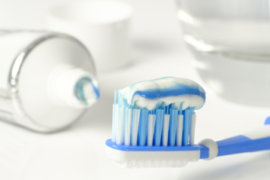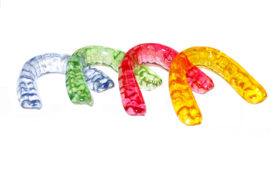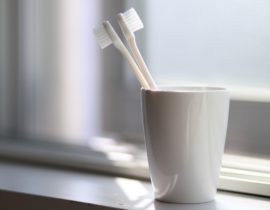Dentist in Thomson
 Tooth decay is the most common chronic disease for children and adolescents. About ¼ of children and more than half of teens currently have this illness. Additionally, the Centers for Disease Control and Prevention (CDC) reports that 90% of adults over age 20 have some amount of tooth-root decay. However, tooth decay is highly preventable. By providing effective dental care during childhood, better long-term oral health may be achieved.
Tooth decay is the most common chronic disease for children and adolescents. About ¼ of children and more than half of teens currently have this illness. Additionally, the Centers for Disease Control and Prevention (CDC) reports that 90% of adults over age 20 have some amount of tooth-root decay. However, tooth decay is highly preventable. By providing effective dental care during childhood, better long-term oral health may be achieved.
Here are some practices that can help prevent tooth decay, gum disease, and other oral health issues at every age:
Hygiene
Brush teeth twice each day with a soft-bristled brush. Clean your tongue gently with your toothbrush or a tongue scraper. Use fluoride toothpaste to help strengthen enamel. Children should use only toothpastes designed for kids’ use. Replace toothbrushes every 2-3 months.
Clean between teeth daily. Use dental floss or another interdental cleaner. Talk to your hygienist for a recommendation and instructions for effective use.
Diet
Eat healthy foods and limit sugary and acidic foods. Drink plenty of water.
Sealants
A recent study on the effectiveness of sealants was published jointly by the American Dental Association (ADA) and the American Academy of Pediatric Dentistry (AAPD). They found that sealants can prevent up to 80% of tooth decay in permanent molars when used for children and teens. Adults may see similar benefits from use, as well. Additionally, no adverse effects have been reported with use of sealants on patients of any age. Talk to our dentist about whether dental sealants may help you prevent tooth decay.
Fluoride
Fluoridation of public water has been listed by the CDC as one of the great achievements in public health in the 20th century. Studies have shown tooth decay in children who have fluoridated water sources is reduced by up to 40%. If you have concerns about tooth enamel weakness or if you live in an area without fluoridated water, ask our dentist whether supplemental fluoride may be right for you.
Dental Care
Visit our office for a professional cleaning and thorough exam at least twice each year, or as instructed. Seek treatment right away if issues are identified.
Effective preventive care saves time and money and can help ensure a lifetime of healthy, beautiful smiles. For more information about tooth decay prevention, contact our office.
540 West Hill St.
Thomson, GA 30824
Phone:(706) 595-5152


 How often does your child eat candy? According to a study conducted by the USDA Economic Research Service, children under 12 consume an average of 49 pounds of sugar in one year. While candy is not the sole source of sugar in a child’s diet, the impacts of sugary candy treats are particularly harmful to teeth. Here’s what you need to know about candy and how it might be damaging your child’s smile.
How often does your child eat candy? According to a study conducted by the USDA Economic Research Service, children under 12 consume an average of 49 pounds of sugar in one year. While candy is not the sole source of sugar in a child’s diet, the impacts of sugary candy treats are particularly harmful to teeth. Here’s what you need to know about candy and how it might be damaging your child’s smile. Oral health is important at every stage in life. Just because your children are going to lose their primary (baby) teeth eventually doesn’t mean that we can ignore the importance of dental care. Tooth decay can be painful and uncomfortable to treat. To protect your child’s smile, it is vital to understand optimal preventive care.
Oral health is important at every stage in life. Just because your children are going to lose their primary (baby) teeth eventually doesn’t mean that we can ignore the importance of dental care. Tooth decay can be painful and uncomfortable to treat. To protect your child’s smile, it is vital to understand optimal preventive care. Chipping a tooth could be uncomfortable and embarrassing. Fortunately, there are a number of ways to fix a chipped tooth. We will recommend a solution based on your particular needs. Here are three options we may provide you:
Chipping a tooth could be uncomfortable and embarrassing. Fortunately, there are a number of ways to fix a chipped tooth. We will recommend a solution based on your particular needs. Here are three options we may provide you: Brushing your teeth is the cornerstone of your oral health care – but is there room for improvement? Use our guide to determine if you’ve fallen into these common brushing habit mistakes, so you can keep your smile healthy and bright.
Brushing your teeth is the cornerstone of your oral health care – but is there room for improvement? Use our guide to determine if you’ve fallen into these common brushing habit mistakes, so you can keep your smile healthy and bright. Losing a tooth can make simple tasks difficult. A missing tooth can impact the way you smile, eat, and talk. If your child plays sports, they are at a higher risk for losing a tooth. It is important for them to visit us to discuss potential protective solutions. Mouth guards are a useful tool for keeping your child’s teeth healthy. Here’s what you need to know.
Losing a tooth can make simple tasks difficult. A missing tooth can impact the way you smile, eat, and talk. If your child plays sports, they are at a higher risk for losing a tooth. It is important for them to visit us to discuss potential protective solutions. Mouth guards are a useful tool for keeping your child’s teeth healthy. Here’s what you need to know. We’ve all been told at least once in our life that flossing daily is crucial. Here are four reasons why flossing may be beneficial for your oral health routine:
We’ve all been told at least once in our life that flossing daily is crucial. Here are four reasons why flossing may be beneficial for your oral health routine: Keeping up optimal oral health takes more than brushing and flossing. Maintaining oral hygiene demands a bit of work, but it is worth it in the long run. Here are four ways you can improve your dental health right now.
Keeping up optimal oral health takes more than brushing and flossing. Maintaining oral hygiene demands a bit of work, but it is worth it in the long run. Here are four ways you can improve your dental health right now. You may not realize it, but you could be at risk of developing an unsightly medical condition known as hairy tongue. While it is harmless in most cases, hairy tongue is still an unpleasant ailment. The causes are not always completely known, but practicing good oral hygiene at home and visiting our dental office for cleanings can help prevent the issue. Here’s what you need to know.
You may not realize it, but you could be at risk of developing an unsightly medical condition known as hairy tongue. While it is harmless in most cases, hairy tongue is still an unpleasant ailment. The causes are not always completely known, but practicing good oral hygiene at home and visiting our dental office for cleanings can help prevent the issue. Here’s what you need to know. Your smile is one of the first things a person will notice when you meet. If you would like to improve your smile with a simple procedure, teeth whitening may be a great option for you, especially if you have stained, dull or discolored teeth. Our dental office is providing teeth whitening services to new and existing patients.
Your smile is one of the first things a person will notice when you meet. If you would like to improve your smile with a simple procedure, teeth whitening may be a great option for you, especially if you have stained, dull or discolored teeth. Our dental office is providing teeth whitening services to new and existing patients.



